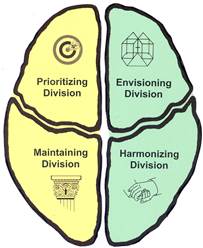Loss and Grief
 ©Arlene R. Taylor PhD
©Arlene R. Taylor PhD
Every human being on the planet experiences losses, whether or not they recognize and identify them. Sadness is the appropriate core emotion that signals a loss, provides energy to grieve the loss, and then move on into healthiness living. As with many other situations in life, individuals tend to approach loss and grief based on learned behaviors that have been strongly ingrained over the years through expectations and role-modeling (including epigenetics or cellular memory) or on their innate brain bent or on a mix of both.
 In general, males tend to have been socialized to act strong (if not outright macho) in the face of loss and grief. Many are taught that to exhibit any type of grief, especially through tears, is unmasculine and exhibits weakness. This can actually delay grief recovery and develop a slush-fund of unresolved grief that can cascade forward when another loss occurs, triggering an over-reaction. Some have been taught to just "suck it up" and avoid talking about the loss or how they feel about it. Because of this, males are more likely to appear silent and stoic in the face of loss and grief and act out their emotions through behaviors such as:
In general, males tend to have been socialized to act strong (if not outright macho) in the face of loss and grief. Many are taught that to exhibit any type of grief, especially through tears, is unmasculine and exhibits weakness. This can actually delay grief recovery and develop a slush-fund of unresolved grief that can cascade forward when another loss occurs, triggering an over-reaction. Some have been taught to just "suck it up" and avoid talking about the loss or how they feel about it. Because of this, males are more likely to appear silent and stoic in the face of loss and grief and act out their emotions through behaviors such as:
- Crashing a vehicle
- Embarking on an emotional or physical affair with another person
- Neglecting family members
- Making excessive financial expenditures
- Distancing themselves from the family (especially if that reminds them that they were "unable" to prevent the loss or fix it after it occurred
- Using alcohol (or other drugs) excessively
- Exacerbating existing addictive behaviors
 Females, on the other hand, have typically been socialized to express their emotions related to grief and loss both verbally and through crying. The gender differences can be observed in early childhood as boys are told to "stop crying and be a man," while females are often petted and comforted and allowed (if not encouraged) to shed tears. While tears are not considered acceptable for females in the workplace, some females have learned to use them to their manipulative advantage in personal arenas. Although some studies show that tears, especially when exhibited frequently, can serve as a damper on a male’s libido.
Females, on the other hand, have typically been socialized to express their emotions related to grief and loss both verbally and through crying. The gender differences can be observed in early childhood as boys are told to "stop crying and be a man," while females are often petted and comforted and allowed (if not encouraged) to shed tears. While tears are not considered acceptable for females in the workplace, some females have learned to use them to their manipulative advantage in personal arenas. Although some studies show that tears, especially when exhibited frequently, can serve as a damper on a male’s libido.
Refer to the Mini-Monograph Loss, Grief, and Recovery for more examples of gender differences and additional information.
|
|
|
|
|



 Maintaining Division
Maintaining Division
